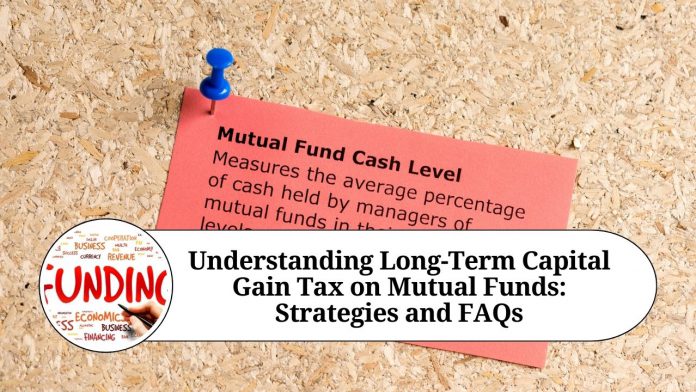Understanding Long-Term Capital Gain Tax on Mutual Funds: Strategies and FAQs
Investing in mutual funds can be an excellent way to grow your wealth over the long term. However, it’s important to understand the tax implications of your investments, especially when it comes to long-term capital gain tax on mutual funds. In this blog, we’ll break down everything you need to know about long-term capital gain tax on mutual funds, including strategies to minimize your tax liability and frequently asked questions.
What is Long-Term Capital Gain Tax on Mutual Funds?
Long-term capital gain tax is a tax on the profits you make from selling your mutual fund shares after holding them for more than one year. The tax rate on long-term capital gains is typically lower than the rate on short-term capital gains or ordinary income, making it a more favorable tax treatment. However, the tax rate can vary depending on your income level and other factors.
Strategies to Minimize Your Long-Term Capital Gain Tax on Mutual Funds
- Invest in tax-efficient mutual funds: Some mutual funds are designed to be more tax-efficient than others. For example, index funds and exchange-traded funds (ETFs) tend to have lower turnover rates, which can reduce the tax impact of the fund. Additionally, some mutual funds are specifically designed to minimize taxes by using strategies like tax-loss harvesting.
- Hold your mutual fund shares for more than one year: The longer you hold your mutual fund shares, the lower your long-term capital gain tax rate will be. If you’re planning to sell your mutual fund shares, consider waiting until you’ve held them for at least one year to take advantage of the lower tax rate.
- Consider tax-loss harvesting: Tax-loss harvesting is a strategy where you sell investments that have declined in value to offset gains in other investments. By doing this, you can reduce your tax liability. However, be aware that there are rules around tax-loss harvesting that you’ll need to follow.
- Use tax-advantaged accounts: Investing in mutual funds through a tax-advantaged account like a 401(k) or IRA can help you minimize your tax liability. These accounts offer tax benefits that can help you grow your investments more quickly
Long-term capital gain tax on mutual funds is an important consideration for investors who are looking to build wealth over the long term. While the tax rate on long-term capital gains is typically lower than the rate on short-term capital gains or ordinary income, it’s still important to be aware of the tax implications of your investments.
Investing in tax-efficient mutual funds, holding your mutual fund shares for more than one year, considering tax-loss harvesting, and using tax-advantaged accounts can all help you minimize your long-term capital gain tax liability. By taking advantage of these strategies, you can maximize your investment returns and minimize your tax burden.
It’s also important to note that long-term capital gain tax is not the only tax that you’ll need to consider when investing in mutual funds. You’ll also need to pay attention to any dividends or short-term capital gains that your mutual fund generates. Additionally, mutual funds held in tax-advantaged accounts like 401(k)s and IRAs have different tax rules that you’ll need to be aware of.
If you’re unsure about how long-term capital gain tax and other taxes may impact your investments, it’s always a good idea to consult with a tax professional or financial advisor. They can help you develop a tax-efficient investment strategy that aligns with your long-term financial goals.
In summary, understanding long-term capital gain tax on mutual funds is crucial for successful investing. By following tax-efficient strategies and working with a professional, you can minimize your tax burden and maximize your investment returns.
Other Related Blogs: Section 144B Income Tax Act
Frequently Asked Questions (FAQs)
Q: What is the difference between short-term capital gains and long-term capital gains? A: Short-term capital gains are profits made from selling an investment held for less than one year, while long-term capital gains are profits made from selling an investment held for more than one year.
Q: What is the tax rate for short-term capital gains? A: The tax rate for short-term capital gains is the same as your ordinary income tax rate, which can vary based on your income level.
Q: How do I calculate my long-term capital gain tax liability? A: Your long-term capital gain tax liability is based on your income level and the duration of time you held the investment. The tax rate is typically 15% or 20%, but can be as high as 23.8% for high-income earners.
Q: Can I avoid long-term capital gain tax on mutual funds? A: While you can’t completely avoid long-term capital gain tax on mutual funds, you can minimize your tax liability by following tax-efficient strategies like holding your shares for more than one year, investing in tax-efficient mutual funds, and using tax-advantaged accounts.
Q: How are mutual fund dividends taxed? A: Mutual fund dividends are taxed as ordinary income, regardless of how long you’ve held the shares.
Q: Can I offset long-term capital gains from mutual funds with capital losses from other investments? A: Yes, you can use capital losses from other investments to offset capital gains from mutual funds. This is known as tax-loss harvesting.
Q: Are there any penalties for selling mutual fund shares before holding them for one year? A: If you sell mutual fund shares before holding them for one year, you’ll be subject to short-term capital gain tax, which is typically higher than long-term capital gain tax.
Q: What are some tax-efficient mutual funds? A: Tax-efficient mutual funds typically have lower turnover rates and are designed to minimize taxes. Examples include index funds and ETFs. However, it’s important to do your research and consult with a professional before investing in any mutual fund.




















